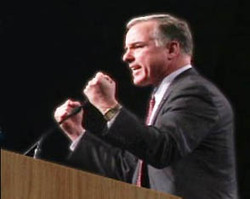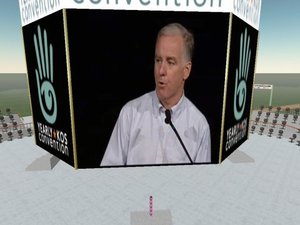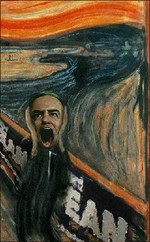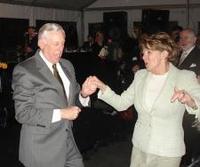In about three months we’ll come up on a fascinating anniversary which few in the press will mention. (Image from Rantical.)
On March 22, it will have been five years since Howard Dean’s "democratic wing of the Democratic Party" speech.
It’s an important event when you compare where we are now to where we were then.
In March 2003 Democrats were in disarray, the base hopelessly divided from the party’s center. Today it’s Republicans who are in disarray, the base spinning off in all directions from the party’s center.
Dean’s speech crystallized, in just 20 minutes, the themes that now animate the majority of Americans:
- Ending the war.
- Balancing the budget.
- Health insurance for everyone.
- Caring for the needy.
Dean laid out other markers on that day. A desire to re-animate young voters. A call to conservation and the environment. The 50-state strategy. Absolute inclusiveness. Intellectual honesty and consistency. Honest government.
(This image was taken by Dilletanteville of Dean speaking at this year’s YearlyKos event, as presented at SecondLife.)
It has been tragic, in a way, that the Netroots movement Dean’s speech
helped galvanize that day has been so divided on the party’s 2008
nominee. John Edwards, Barack Obama, Bill Richardson and even Chris Dodd have had
strong support, and nearly every candidate has gotten significant money from people who got their start in the Dean campaign, by
putting in small contributions and just speaking their minds.
But in hindsight this apparent weakness is a strength. All the
Democratic Party’s candidates, even Hillary Clinton, are running,
essentially, as Deaniacs. The differences among them are primarily
differences in stridency, or emphasis, or personality. On the basics
they’re very similar. They’re all cut from the same cloth. They all
claim to speak for the democratic wing of the Democratic Party.
There are some other important points about that Dean speech I want to make note of:
- The Cadences. Dean used the repetitive cadences of the
black church, both to start his speech and at its close. "What I wanna
know," he began, calling the faithful to him. "I want my country back,"
he concluded. I was a little surprised, re-reading it, that his famous
"you have the power" line didn’t appear until later. - The Pride. Every single line of the speech rings with a
pride in being a Democrat, a liberal, progressive Democrat. Dean
spoke just months after Paul Wellstone’s tragic death, just as
Americans were about to enter Iraq, at a time when liberal pride was at
its nadir. He began the process of bringing that back, and now it seems
like the common coin.
One other important point. Howard Dean didn’t just talk the talk. He
walked the walk. He didn’t just say he wanted to seek votes everywhere.
As Democratic National chair, he has put money behind that promise, so
now there are strong Democratic organizations and candidates in places like Montana and Idaho and
Alaska and Kansas, even Texas.
The Republican heartland today consists of just 5 states —
coincidentally the same 5 states won by George Wallace, by Barry
Goldwater, and by Strom Thurmond. Louisiana. Mississippi. Alabama.
Georgia. South Carolina. The people at the core of the Republican
coalition today are fearful, and in the center of that coalition is
pure, outright, disgusting racism. Everywhere else Democrats are more
than competitive, they’re advancing.
Even on the rim of the Deep South, in Kentucky and North Carolina and
Virginia, Democrats are advancing. Not just Democrats, but Democrats
from the democratic wing of the Democratic Party.
Howard Dean didn’t do that alone. Howard Dean just lit a match. Howard
Dean just set off a spark. Howard Dean was helped by history, by the
incredible failures of this Administration, and by his own failure in
Iowa, which brought him into the party chair.
From a rump, dispirited minority in early 2003, Howard Dean has built a majority coalition in less than five years.
History will classify this with the great political performances in all
of American history. It will rank alongside the launch of movement
conservatism in the 1960s, the rise of liberal democracy in the 1930s,
the rise of the Populists and progressives in the 1890s, the creation
of the Republican Party in the 1850s and the rise of the Democratic Party itself in the 1820s.
A lot of people right now are dissing Howard Dean, still. He is derided
for the "Dean Scream," called a loser, and his 50-state strategy may
not survive his chairmanship. But he has been an important historical
figure, and college students will study his career for centuries to
come, long after most of today’s politicians have been forgotten.
Howard Dean is the father of the 21st century Democratic Party. If you want to write his political obituary, he’d be happy to have that on its headstone.














And the invisible democrat, Dennis Kucinich, becomes just a little more invisible.
Dana, how about your thoughts on how and why Kucinich has disappeared from the race while still fully engaged in running?
I think it’s a very revealing story.
And the invisible democrat, Dennis Kucinich, becomes just a little more invisible.
Dana, how about your thoughts on how and why Kucinich has disappeared from the race while still fully engaged in running?
I think it’s a very revealing story.